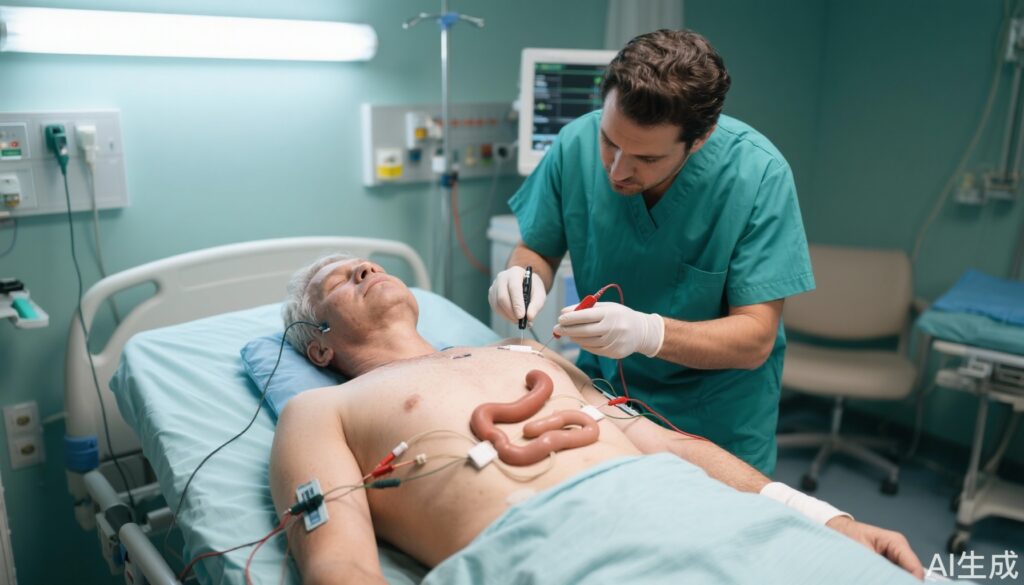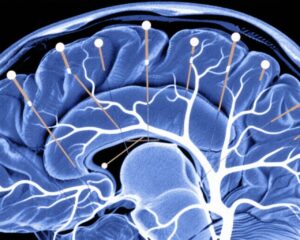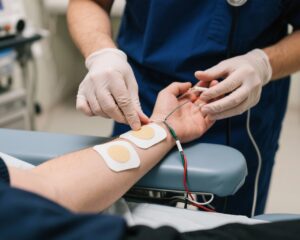Highlight
Electroacupuncture (EA) significantly reduces the time to first flatus and first defecation after laparoscopic gastrectomy for gastric cancer compared with sham EA and standard care. EA also lowers the incidence of prolonged postoperative ileus (POI) with no serious adverse events reported.
Study Background and Disease Burden
Postoperative ileus (POI) — a temporary impairment of bowel motility — is a common and challenging complication following laparoscopic gastrectomy for gastric cancer. It prolongs hospital stay, increases healthcare costs, and delays the initiation of oral nutrition, adversely impacting recovery and quality of life. Despite enhanced recovery after surgery (ERAS) protocols, effective interventions to shorten POI remain limited. Electroacupuncture (EA), an integrative therapy stimulating defined acupuncture points with electrical current, has shown promise in gastrointestinal motility modulation, but robust evidence in large clinical trials, especially for gastric cancer surgery, has been scarce.
Study Design
This was a rigorous, multicenter, randomized controlled trial conducted at seven hospitals across China. Between October 27, 2021, and December 21, 2023, 585 adult patients scheduled for laparoscopic gastrectomy for gastric cancer were enrolled. All participants received standard perioperative care, including ERAS elements.
Patients were randomized into three groups: four sessions of electroacupuncture (EA), four sessions of sham electroacupuncture (SA), or standard care alone without acupuncture. The primary efficacy endpoint was time to first flatus, a clinically relevant indicator of gastrointestinal recovery. Secondary endpoints included time to first defecation, dietary tolerance, quality of life measures, postoperative mobilization, and length of hospital stay.
Key Findings
Of 585 enrolled, 578 participants completed the full analysis set. The EA group showed a significant reduction in time to first flatus compared to SA and standard care groups. Specifically, EA reduced time to first flatus by about 13 hours relative to SA (95% CI, -19.17 to -6.75; P < .001) and by approximately 24.5 hours relative to standard care (95% CI, -30.61 to -18.30; P < .001).
Similarly, time to first defecation was reduced by 15.4 hours against SA (95% CI, -27.73 to -3.09; P = .007) and 24.7 hours versus standard care (95% CI, -36.76 to -12.55; P < .001) with EA. Beyond raw times, the incidence of prolonged POI was significantly lower in the EA arm — with risk difference reductions of 0.41 compared with SA and 0.56 versus standard care (both P < .001).
No severe adverse events related to EA or sham interventions were reported, indicating good safety and tolerability.
Expert Commentary
This trial provides strong high-quality evidence for clinicians and surgical teams aiming to reduce postoperative ileus following gastric cancer surgery. The sizeable sample, multicenter design, and inclusion of sham controls enhance the reliability and generalizability of these findings. Acupuncture’s role in modulating autonomic nervous system activity and promoting gastrointestinal motility may underlie the observed benefits.
However, further mechanistic studies could clarify specific neural or humoral pathways involved. Also, as the study population was exclusively Chinese patients, extrapolation to diverse ethnic groups requires careful validation. Attention to training and standardization of acupuncture procedure is critical to reproducibility.
Conclusion
Electroacupuncture is an effective adjunctive therapy that shortens postoperative ileus duration and accelerates gastrointestinal recovery in patients undergoing laparoscopic gastrectomy for gastric cancer. Its integration into perioperative care can enhance recovery without incurring serious adverse events, addressing a significant unmet clinical need. Future guidelines may consider recommending EA as part of multimodal ERAS programs tailored for gastric cancer surgery.
References
Pei L, Wang G, Yang S, Zhou S, Xu T, Zhou J, Zhang W, Lu K, Hu L, Wang Y, Wang K, You D, Wu Y, Li L, Guo J, Sun J. Electroacupuncture Reduces Duration of Postoperative Ileus After Laparoscopic Gastrectomy for Gastric Cancer: A Multicenter Randomized Trial. Gastroenterology. 2025 Jul;169(1):73-84. doi: 10.1053/j.gastro.2025.02.006. Epub 2025 Feb 18. PMID: 39978558.


